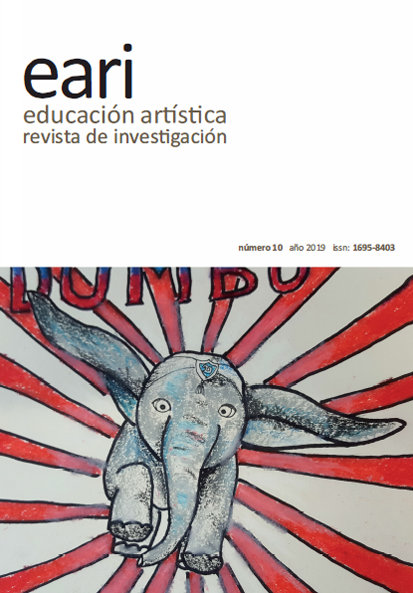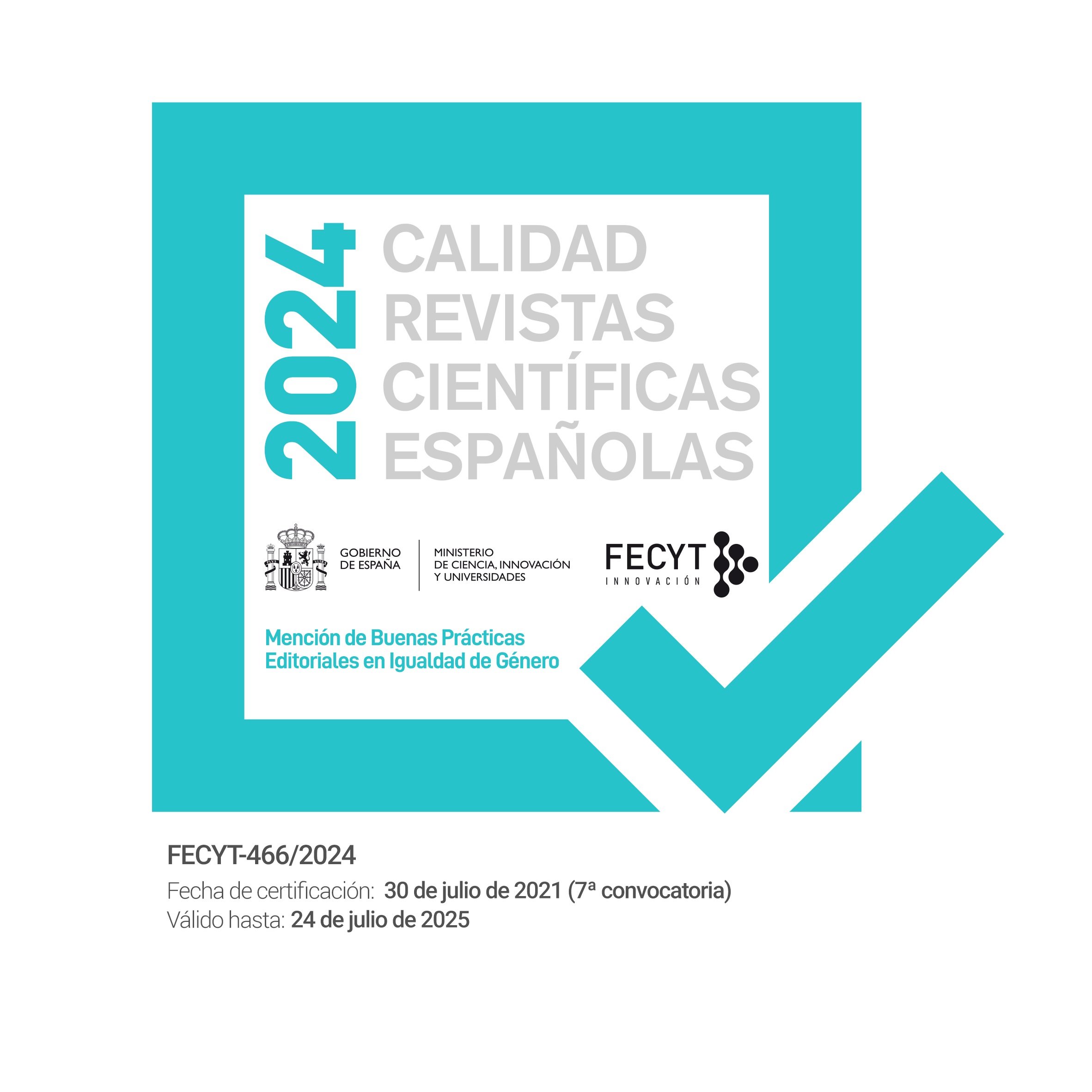An embodied experience of performing arts research in university theater studies
DOI:
https://doi.org/10.7203/eari.10.14309Keywords:
Performing Arts university studies, Art-based Research, embodied experience, A/r/tography, performative Abstract
Abstract
This article presents a pedagogical and research proposal in Performing Arts university studies based on theoretical analysis, and on physical, intellectual and emotional experience of scenic creative processes. Throughout it, we will see how the difficulty of Performing Arts studies to integrate into the scientific field and into the Academy can be used to build new educational and creative paths, taking into account the specificity of Theater, alive and ephemeral by nature. We will go through the path of Arts-Based Research, A / r / tography (branch of ABR) and previous experiences of Theater-Based Research. We will combine an organic and holistic vision based on the idea of art as an embodied experience, and the approach to research as a work in permanent process. As for the aesthetic, a transversal perception of theatre will prevail within the framework of the so-called “expanded theatricalities” linked to the concept of “performative”. In a second phase, we will link this theory with the description and analysis of practical cases carried out in the Degree of Performing Arts of the University of Girona (EU ERAM), to try to assess the effectiveness of the proposal, in addition to seeking to settle valid parameters for evaluation.
 Downloads
Downloads
 References
References
Artaud, A. (2011). El teatro y su doble. Barcelona: Edhasa.
Austin, J. L. (2016). Cómo hacer cosas con palabras. Barcelona: Paidós.
Barone, T y Eisner, E. (2011). Arts Based Research. Los Ángeles: Sage.
Beck, J. L., Belliveau, G. Lea, G. W., y Wager, A. (2011). Delineating a Spectrum of Research-Based Theatre. Qualitative Inquiry 17(8). Recuperado de: http://qix.sagepub.com/content/17/8/687.
Belliveau, G. y Lea, G. W. (Eds.) (2016). Research-based Theatre: An Artistic Methodology. Bristol: Intellect Ltd.
Berger, J. (2017). Modos de ver. Barcelona: Editorial Gustavo Gili.
Boal, A. (2009). Teatro del oprimido. Barcelona: Alba Editorial.
Borgdorff, H (2012). The Conflict of the Faculties. Perspectives on Artistic Research and Academia. Leiden: Leiden University Press.
Bourriaud, N. (2015). Estética relacional. Buenos Aires: Adriana Hidalgo Editora.
Brook, P. (2015). El espacio vacío. Barcelona: Península
Chéjov, M. (1999). Sobre la técnica de la actuación inspirada. Barcelona: Alba Editorial.
De Botton, A. y Armstrong, J. (2017). El arte como terapia. Barcelona: Phaidon.
Della Fonte, L., Krasmanski, O., y Proz, J. (2015). Investigación en las artes visuales: la producción artística como investigación. Apuntes y reflexiones. En VV. AA. La investigación disciplinaria en lenguajes: cuadernos de investigación (pp. 7-25). Buenos Aires: Universidad Nacional de las Artes.
Dewey, J. (2008). El arte como experiencia. Barcelona: Paidós.
Eisner, E. W. (2004). El arte y la creación de la mente. Barcelona: Paidós.
Fischer-Lichte, E. (2017). Estética de lo performativo. Madrid: Abada Editores.
Hearing, T. y Jones, K. (2018). Film as Research/Research as Film. En En Leavy, P. (ed.). Handbook of Art-Based Research (pp. 425-436). New York & London: The Guilford Press.
Hernández, F. (2008). La investigación basada en las artes. Propuestas para repensar la investigación en educación. Educatio Siglo XXI, 26, 85-118.
Irwin, R.L., LeBlanc, N., Ryu, J. Y., y Belliveau, G. (2018). A/r/tography as Living Inquiry. En Lea, G. W., Belliveau, G., Wager, A., y Beck, J.L. (2011). A Loud Silence: Working with Research-based Theatre and A/R/Tography. International Journal of Education & the Arts,12(16). Recuperado de http://ijea.org/v12n16
Leavy, P. (2018a). Introduction to Arts-Based Research. En Leavy, P. (Ed), Handbook of Art-Based Research (pp. 3-21). New York & London: The Guilford Press.
Leavy, P. (2018b). Criteria for evaluating Arts-Based Research. En Leavy, P. (Ed), Handbook of Art- Based Research (pp. 575-586). New York & London: The Guilford Press.
Lehman, H.T. (2013). Teatro posdramático. Murcia: CENDEAC.
Merleau-Ponty, M. (2017). El ojo y el espíritu. Madrid: Trotta.
Nietzsche, F. (2012). El nacimiento de la tragedia. Madrid: Alianza Editorial.
Norris, J. (2018). Reflections on the Techniques and Tones of Playbuilding by a Director/Actor/Researcher/Teacher. En Leavy, P. (Ed.), Handbook of Art-Based Research (pp. 288-307). New York & London: The Guilford Press.
Sánchez, J. A. (1999). La escena moderna. Manifiestos y textos sobre teatro en la época de las vanguardias. Madrid: Akal.
Sánchez, J. A. y Pérez Royo, V. (2010). La investigación en artes escénicas. Introducción. Cairon, 13. Revista de estudios de danza. Práctica e investigación, 5-15. Alcalá de Henares: Universidad de Alcalá.
Saldaña, J. (2011). Ethnotheatre: Research from page to stage. California: Left Coast Press, 2011.
Sanders, J. H. (2006). Performing Arts-Based Education Research: An Epic Drama of Practice, Precursors Problems and Possibilities. Studies in Art Education. A Journal of Issues and Research 2006, 48(1), 89-107. Recuperado de:
https://www.jstor.org/stable/25475807?seq=1#page_scan_tab_contents.
Snowber, C. (2018). Living, Moving, and Dancing: Embodied Ways of Inquire. En Leavy, P. (Ed.), Handbook of Art-Based Research (pp. 247-266). New York & London: The Guilford Press.
Sullivan, G. (2004). Art Practice Research Inquiry in the Visual Arts. New York: Teachers College Columbia University.
Szondi, P. (2011). Teoría del drama moderno (1880-1905). Una tentativa sobre lo trágico. Madrid: Dykinson.
Vidiella, J. (2018). El arte de la investigación o de la investigación basada en las artes. En VV. AA., Polaritats 2016-2017. Un año de mediación artística (pp. 60-75). Barcelona: Homesession i Institut Ramon Llul.
Downloads
Published
How to Cite
-
Abstract837
-
PDF (Español)387
Issue
Section
License
![]()
Educación artística: revista de investigación (EARI) retains the proprietary rights (copyright) of published works, and favors and allows the reuse of the same under the license Creative Commons Attribution-Noncommercial Use 4.0 International License (CC-BY-NC 4.0), which allows third parties to use the published material whenever the authorship of the work and the source of publication is mentioned (journal, publisher and URL of the work), and it is used for non-commercial purposes.
Authors are encouraged to disseminate their work after it has been published, through the internet (for example, in institutional archives online or on its website) which can generate interesting exchanges and increase work appointments.








